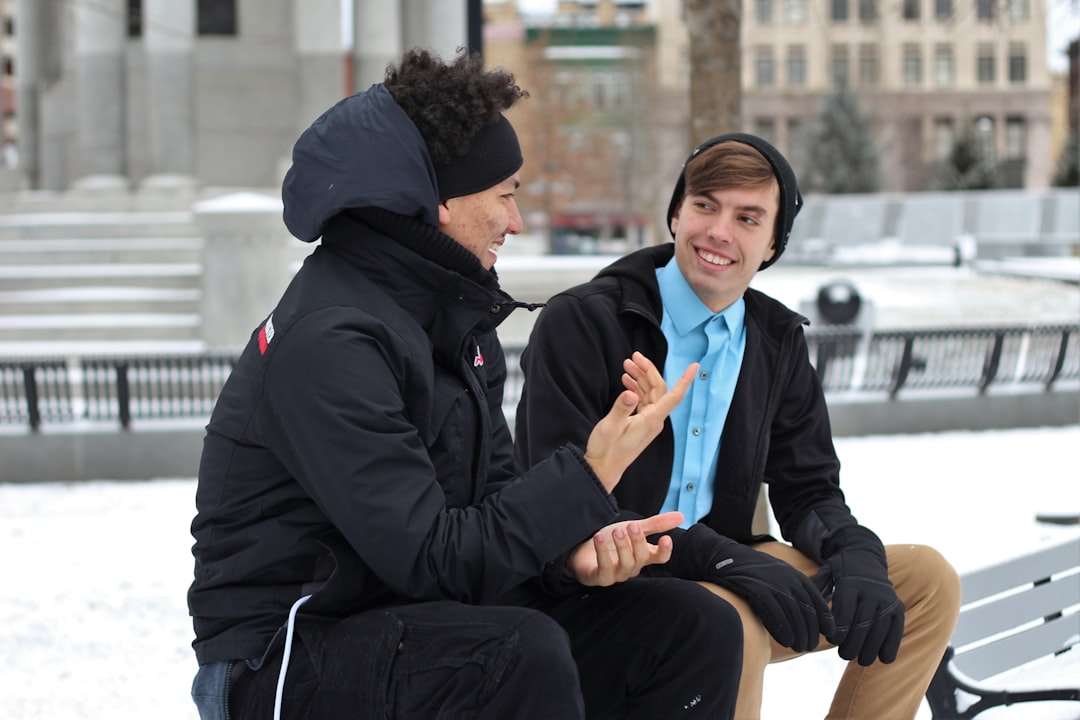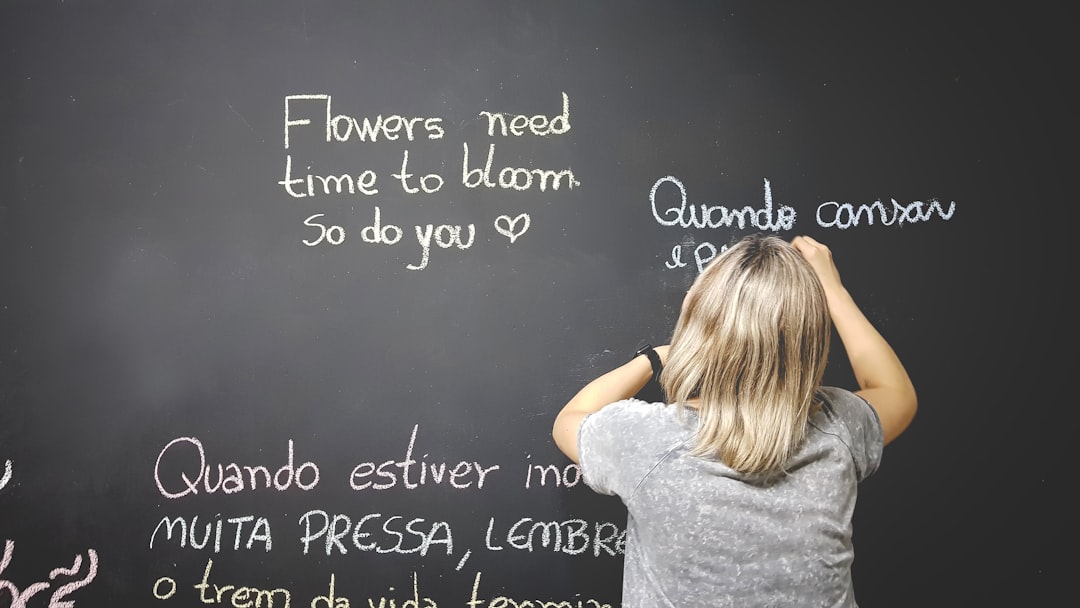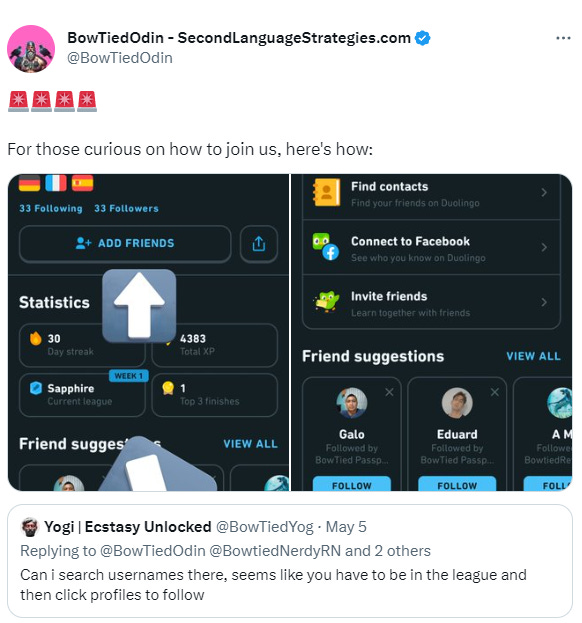Welcome, aspiring polyglot! Today we have a guest post from Jungle resident
. Personally, his addiction recovery content is what drew me to him from day 1, but he has much more than that to offer. As he often says, there is far more to beating addiction than simply staying sober. When I initially asked him about a guest post, I had no idea what his background was. I was trying to take all the credit for his love of languages. Clearly, I was not the initial inspiration, but I am honored to have him so active in the community. Forever learners are always the most fun to be around. With that said, I hope you enjoy the read as much as I did!Hi, my name is Tabby and I love learning languages. I am fluent in English and Spanish, speak a bit of Haitian Creole and Japanese, understand some spoken French (if you speak slowly), and can navigate very basic conversational German. How did I get here, why does it come easily to me, and why will it continue for the rest of my life?
I grew up in a small redneck town about an hour south of Seattle, WA. My dad, who is autistic, was an army brat-turned-drill sergeant in the 50s, 60s and 70s, so he traveled a lot in his early life. He speaks fluent Spanish, French, German, Japanese, a little bit of Mandarin and Korean, and knows Latin and Greek very well. And he integrated them all into my childhood as if they were normal, everyday things. He was, and is, obsessed with linguistics and etymology and history and would constantly tell the whole family where and how certain word roots are connected and how knowing Latin “gives you a leg up in life,” sometimes in the middle of others’ stories even (genuinely autistic folks are not usually socially gifted).
While my mother and my sibling rolled their eyes at it, I was intrigued from a young age. Growing up, my sibling and I heard “es tut mir ganzan leid” (“I’m so sorry” in German) or “pobrecito” (“you poor thing” in Spanish) with a sarcastic tone any time we complained or “nimm platz” (“sit down” in German) when we were being rowdy. We heard “venga” or “ven aqui” (“come here” in Spanish) or “sodesu ka” (“is that so?” in Japanese) or an aggressive Korean version of “come here right now” that I can’t seem to phonetically spell well enough to get Google to figure out (but I do know he said it one time at Disneyland and immediately ended up giving directions to the restroom to a couple of Korean tourists).

We called my grandmother and grandfather Mutti and Vati (German versions of Mom and Dad). Everything growing up was a mishmash of various languages all strung together. My parents were a lower-middle-class couple in an upper-middle-class-and-rising town trying to give their kids an upper class childhood, so to kickstart any proclivities or interests my sibling and I might have had, they threw us into as many activities as possible.
By age 3 I was taking piano and percussion lessons and learning the basics of ear training in music and taking ice skating classes. By age 4 I was reading kids books and writing complete sentences at the behest of my grandfather who, in lieu of spoiling his grandkids, decided we were going to be as well-rounded as possible as early as possible. At age 5, they had me in baseball, soccer, basketball, and volleyball wherever there was a recreational league. But the biggest part of kickstarting our “worldly” education was this: My mom took a job at an expensive private school so we would get a massive discount on tuition. And then she shoved us into every last community activity she could get us into within the school.
Around my 2nd grade year, she volunteered our family home to house our school’s Japanese exchange teacher, Tomoko, for a year. Not only did Tomoko teach Japanese at our school (only the basics, I was in 2nd grade remember), but at our house she taught us, seemingly out of an evangelistic sense of duty, about Japanese customs and cooking and philosophy and movies. She and my dad used to speak to each other in Japanese and she seemed to really appreciate that she had someone with whom she could actually speak.

I watched everything she did and was fascinated the whole time. After she left, for a short time, my sister had a German exchange student come live with us. Once again, I saw our guest at ease as she had what I now understand were very innocent and simple conversations with my dad who would converse with her almost every night after dinner. I was starting to see that my dad, though he could barely socialize with some of his own family, adored being simply and politely social with people from other cultures and learning from them what he could.
Here’s where some of the “how” comes in. As I mentioned, I started piano and percussion lessons and ear training at age 3, before I had even gotten the hang of walking. Learning music is a lot like Tony Hawk describes skateboarding: It teaches you to accept mistakes and move past them quickly. As Spike Slawson said on Me First and the Gimme Gimmes’ album ‘Ruin Jonny’s Bar Mitzvah’: “If you play a wrong note at some point, that’s just, like, a better value? You know, more notes!” In short: Being into music came in great handy as my limited experiences with Japanese and German came to an end and Spanish entered my life.
When Spanish came around at my school later, our teacher loved me because I didn’t care how bad I was, I would just speak as many words of a sentence I knew in Spanish and then ask for help. Because of this, I excelled quickly through middle school and high school, where I kept with Spanish and even got to go on our Spanish exchange trip to Argentina. From there I went into the world and found language immensely helpful. You don’t need to know the rest of my life story, not just because I’ve gone over it many times before on Twitter and Twitter Spaces, but because it’s moot.

How does language live in my life now? Language and the learning of language is special to me because I find immense value in maximizing my personal skillset and potential. My whole life until just before I discovered The Jungle in 2022 I had avoided doing the hard work, the right work, because everyone had always told me that everything I do is wonderful. However, something has changed since just before I found The Jungle: I’ve been putting in the work I know I’m capable of and have made of myself something closer to my potential than I thought I’d ever get to; and I’m getting closer to my unreachable potential every day.
I don’t say this to brag, but just as a point of fact: Because I’ve made myself good at the skill of learning, I have effortlessly become an asset anywhere I’ve worked. Work that is straightforward with concrete instructions is borderline effortless and that frees up mental capacity to work on things like my attitude or mindset. These things make people gravitate toward me and look to me as an example of how to be. I figure if I can be that good example, then my presence alone is enough to have a positive impact in the world. Or at least my world.
It may sound lofty and/or pretentious but I believe in it and it guides me toward the Buddhist principle of Right Action. But if I can become and remain multi-lingual? Well then that potential impact is multiplied. By a lot. So I press on. Since I started my Jungle journey, thanks to BowTiedOdin and people like him (shoutout to
and and among others), I’ve continued my learning and language journeys much to my delight. I’ve decided that language has to be something I’m always expanding my use and knowledge of.Here’s what I’ve done and how I’m doing it since I decided this: I’ve slowly picked up some of the absolutely psycho sounding hybrid of French and West African that is Haitian Creole by knowing the basics of French (via Latin and ear), asking people at my W-2 job how to say certain things (“behind you,” “I don’t know,” “bathroom,” “little,” “big,” etc.) or what they’re saying, and taking a couple supplemental lessons on Duolingo every few weeks when I think of it. I work with a lot of Haitians, many of whom speak no English, so this language is a must-know on a basic level.
I’ve re-started my German learning by doing Duolingo every day and speaking with my dad on the phone using the words I remember. Duolingo has really changed the game in terms of what I understand with regard to sentence structure and phraseology.
Doing these lessons (and customizing them in my own ways) has me re-watching classics from film school like Fritz Lang’s ‘M’ and ‘The Lives of Others’ or newer movies like ‘All Quiet on the Western Front’ both with and then without subtitles and seeing how much of the sentence structure or individual word choice I’m recognizing. I do this maybe once a week as photo/video projects are rendering or importing for my side business.
Side Note: American movies with German in them like ‘Inglourious Basterds’ are incredible for picking up both phrasing and subtleties between German accents (watch the parlor scene where Major Hellstrom calls people by their accents and then rewatch the whole movie, listening for how they speak in German when they do).
For Spanish, I speak with all the Dominican, Guatemalan, and Mexican natives I work with at my W-2 on a regular basis. We’re all friendly and conversational with each other, but they help me learn more Spanish and I help them learn more English. We keep each other in check for grammar and pronunciation and can use each others’ languages to more correctly teach each other. My next step in Spanish is to take up reading again and to watch more movies from Spain and Mexico (El Piel Que Inhabito is the most recent one I watched with no subtitles, but it was ROUGH to keep up with).
For Japanese, I’m not really learning, so much as I’m watching Japanese cinema and anime (movies, not tv shows yet) every couple weeks trying to get acclimated to recognizing sounds. Once I’ve progressed in German a bit more, I’ll add it to my list of Duolingo lessons and get to watching and reading as much as possible, since I have no one (that I know of) to speak it with outside of the internet. Listen (proverbially, I know you’re reading), I am just an anonymous cartoon cat on the internet, but believe me when I tell you that one of the greatest “good”s in the world is a life of constant learning, growth, and coachability.
That is the basis of a personal ethos based around unending positive change that I’ve developed. Since I started my new life in a new state from scratch, it’s served me excellently. As far as we know, you have only one chance at life, and there are billions of people speaking dozens of languages across the planet. Why not open yourself to the world of possibilities that new languages create and give yourself the gift of constant learning with your time in this plane of existence? Why not constantly strive to be your highest self? There is only to gain.
Thanks for reading! If you’re interested in the philosophical or psychological theories behind addiction recovery (or want updates on how my business is going), you can follow me at @BowtiedTCat on Twitter. If you want occasional film, video, and photography tips for all stages of production, you can follow me at @AnonCameraGuy on Twitter and Instagram. If you want to read longform articles on addiction recovery and my experiences with it, you can read my Substack at BowtiedTabby.substack.com, and if you want to read about movies and movie pitches from my perspective, you can go to BTSTabby.substack.com. I’ll be posting on all of those accounts shortly!
Conclusion
Learning a second language is no easy endeavor. While it can be simple, there are many things that make it complex. That said, all that really matters at the end of the day is consistency. That's why we started the Duolingo movement. It's not the perfect app, but being able to see other people working towards the same goal as you is powerful. Especially when all of those people are rooting for your success, too. There are countless language learning programs, but half an hour on Duolingo, combined with the above second language strategies, will allow the average person to make more progress than most online courses.
It is not impossible to learn a language fast, but if that is the goal it is imperative to understand that it will be difficult. Picking up a foreign language at any speed is going to be challenging. But you can do difficult things and be great. So go do difficult things and become great. I will be here by your side endeavoring to do the same. I'll be here rooting for you and watching out for your successes in the meantime.
For more content check out Second Language Strategies dot com or find me on Twitter or Instagram. If you are struggling to get speaking in your target language, get up to 55% off a Babbel subscription using this link. I look forward to seeing everyone’s progress in the months and years to come.



This was a great read. Tabby has an amazing attitude.